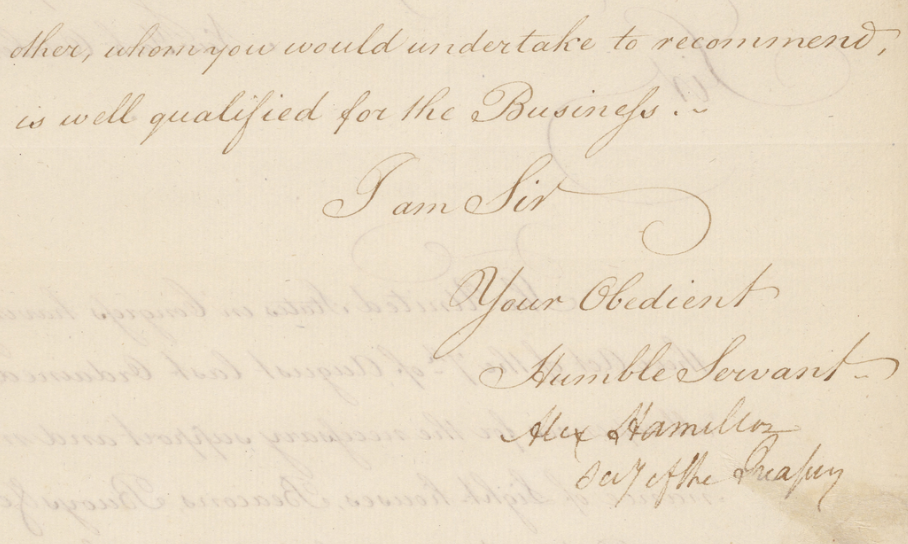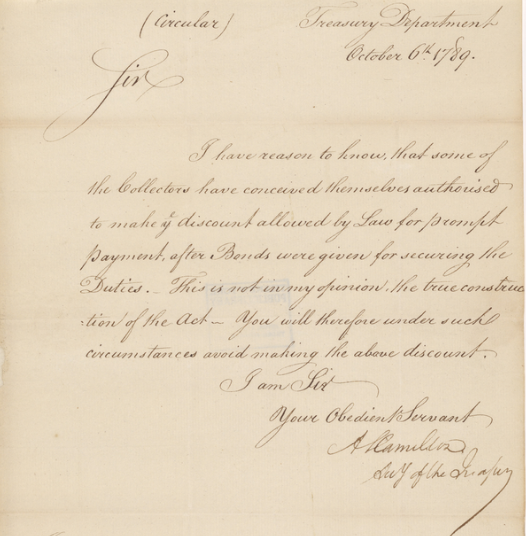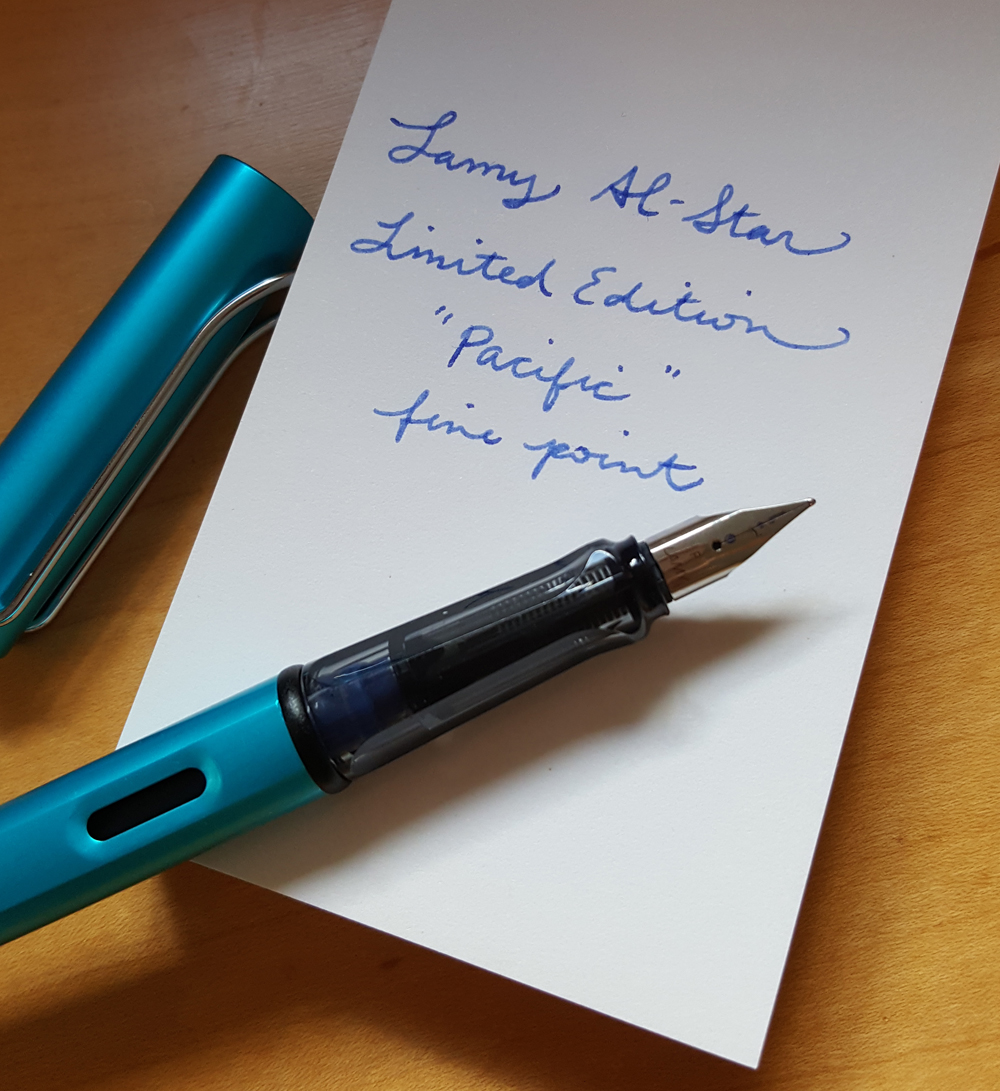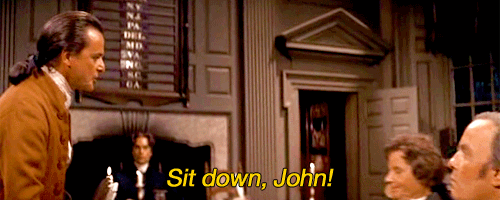This book was soooo cool, but almost twenty dollars so I had to pass, after first of course looking through most of the pictures. Very nice to see all those big, bad cannons in photographic form.


This book was soooo cool, but almost twenty dollars so I had to pass, after first of course looking through most of the pictures. Very nice to see all those big, bad cannons in photographic form.

Posted in Books and Reading | Comments Off on Frigate-Me-Not
So, on the subject of writing with feathers, observe:

This guy did not fuck around. He did have a habit of never crossing the “t” in his name, though. And judging by the many Treasury Dept letters I have looked at, I do not think anyone called him “Alexander.” He was “Alex”, his whole life, to those who knew him, even in business correspondence.
Anyway, when using a quill, why not make huge flourishes everywhere?

It makes things look more important, more formal, more beautiful.

“This is not in my opinion the true construction of the Act.” Nothing gets by Alex, you guys.

I’ll have you know, Secretary Hamilton, that my healthcare provider once gave me a 20% discount for prompt payment in full. Though I suppose this is not equivalent to customs duty, so I beg your pardon, SIR.
Those of us using steel fountain pens can only dream of such glorious penmanship, and with a goose quill no less. I guess when you churn out thousands upon thousands of documents, you get pretty good at it. (Or not; some of these guys still had atrocious handwriting.)
Posted in Hamilton | Tagged handwriting | 2 Comments »

Look at my new pretty. I’m about to write three letters with it. I know, jeez, why don’t you just write with a feather already!
Maybe I will!!
Actually no, that would be terrible.
Posted in Uncategorized | Tagged letters | 2 Comments »

I can’t believe how long it took me to watch “1776”, but I did last night, and best of all, watched along with a crowd of other history enthusiasts on Twitter — including one of my idols, Joanne Freeman, Yale historian and author of “Affairs of Honor.” Yesterday she was recognized by someone on the subway. Pretty cool for a historian!
Anyway, I enjoyed the movie but I will have to try watching it again without all the distractions going on in the room and on my phone.
Posted in History | 2 Comments »
I just finished reading “The Quartet” by Joseph Ellis and wanted to give a few thoughts. Overall I really liked the book — it was a short and sweet (220 pages w/o appendices and footnotes) dissertation on the origin and establishment of the United States Constitution, spanning most of the 1780s, but chiefly 1786-89. The quartet described by the title includes George Washington, Alexander Hamilton, James Madison, and John Jay. Had it been “the Quintet”, you could have thrown Gouverneur Morris in there, too, since he’s the guy who actually put pen to paper and wrote the finished document. “We the people of the United States of America” are his words (originally they wanted to list all the states, he decided on his own to use the country’s name since union was the object).
I underlined a number of passages but here is a favorite: “…the United States came into existence in an era ‘when the rights of mankind were better understood and more clearly defined, than at any former period.’ Immanual Kant had yet to coin the term Enlightenment to describe this chapter in Western history, but even without the convenient vocabulary, Washington clearly grasped the central idea: namely, that the American Revolution had happened at a truly providential moment. It occurred when a treasure trove of human knowledge about society and government had replaced the medieval assumptions — that ‘gloomy age of Ignorance and Superstition’ — and thereby provided Americans with an unprecedented opportunity to construct a society according to political principles that maximized the prospects for personal freedom and happiness more fully than ever before. In effect, European thinkers over the past century had drafted the blueprint for a new political architecture, which was now readily available for Americans to implement.”
This passage stood out to me because it puts forth the idea that, in a way, the Revolution was a foregone conclusion; it was only a matter of time before it would be demanded by the people, and whether the war took seven years or twenty, Britain was probably going to lose. How fortunate America was that this revolution was placed in the hands of incorruptible people like Washington and others, rather than despots, as took place in France the following decade. Also amazing that the Congress didn’t totally bungle the entire thing, though not for lack of trying. It was all a confluence of miraculous events, one after the other.
Before reading this book, and studying the period in general, I didn’t realize how very controversial the Constitution was when it was drafted. Some members of Congress even considered it “illegal” because it replaced the Articles of Confederation without explicit permission to do so. There was great resistance to nationhood; the states thought that after winning the war, they could go back to their disorganized and ineffective confederation. But Madison, who was a brilliant thinker if not a great orator, studied history and found that almost every other example of confederacy had been torn apart eventually by civil war or by foreign conquest. Long before the American Civil War, it was predicted by many as a very real possibility (and most knew the catalyst would be slavery). Without unity, the larger states would prey upon the smaller ones, and larger European countries with money and armies would eventually swoop in to snatch America’s considerable resources. The United States was burdened by massive war debt, no way to pay it off, and no international credit, or reputation. The country was on the brink of imploding, and wasting every effort made in the Revolution.
It was truly a miracle that the Constitution came together when it did, and so quickly, and by such intelligent people, with such obstacles in the way. Political parties did not yet exist (but they would very, very soon), which is one of the many reasons the convention will never again be replicated.
Posted in Books and Reading, History | Comments Off on “The Quartet”
Sorry, it’s been a week, I know. Alas.
Last night I was watching Antiques Roadshow, like ya do, and one of the items featured was this rifle, which was a gift presented to Commodore Thomas Macdonough after he took part in the burning of the USS Philadelphia in 1804 after its capture by Tripoli (they decided it was better to destroy the frigate than to let the enemy have it). I perked up immediately because I literally just read a couple chapters in a book about this very event.

Glory in my nerdery!
Posted in History | Comments Off on Tripolitan Wars
This morning the women’s group I am a part of held an activity that was part self-care and part caring for friends. We put together jars of epsom salts with essential oils and some botanicals. It was pretty easy, and I never take a bath without epsom salts, so I am looking forward to trying mine. The other two are going to friends. I hope giving away bath salts doesn’t send the message “you could use a bath.” Lol.

At the end of the activity we read a few interesting quotations having to do with the theme. This is the one that spoke to me:
What if no one is coming to discover your hidden talents, to acknowledge your untapped potential, to heal you, to save you from yourself? What if the saviour was always supposed to be you? What if that’s why it hasn’t worked out with anyone else?― Vironika Tugaleva
Yesssssssss
Later, I “somehow” ended up at another wine tasting at the fancy grocery store, and verily enjoyed the amazing label on this California chardonnay.

I also enjoyed the wine inside, so I brought one home with me.
Posted in Uncategorized | Tagged wine | Comments Off on Salty
“What is the Battle of Brandywine!!!!!” – me watching Jeopardy! last night, as all my reading and nerding out finally pays off in the form of sweet imaginary cash prizes ($2000).
Posted in Uncategorized | Comments Off on Finally!
Here is something I learned last night while reading Six Frigates: The first real naval battle fought by a United States frigate was engaged off the coast of the tiny island of Nevis, which happens to be Alexander Hamilton’s birthplace, who just happens to be the person who strongly advocated the creation of a Navy in the Unites States.
IT’S THE THE CIRCLE OF LIFE AMERICAN MILITARY HISTORY

Posted in Books and Reading, History | Comments Off on Leeward Isles
My friend forwarded this to me because she gets me.

Posted in Hamilton | Comments Off on “Ham”